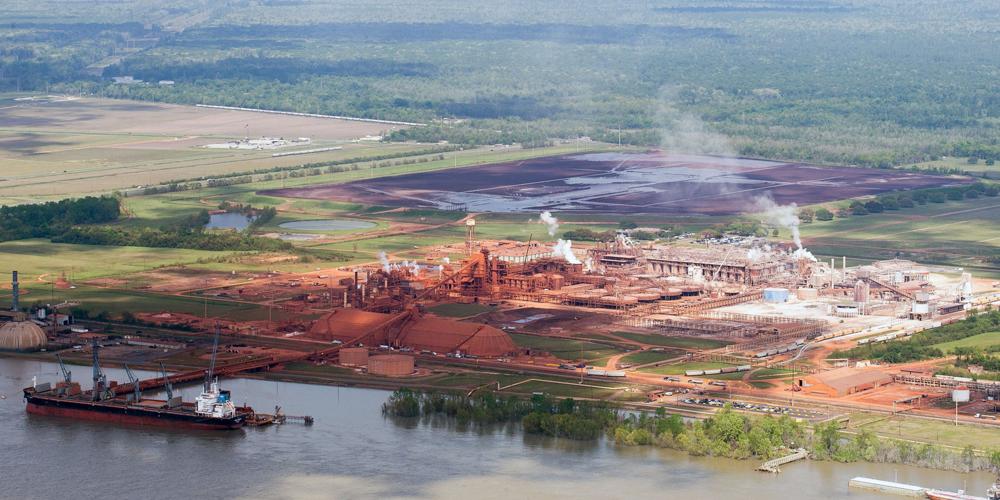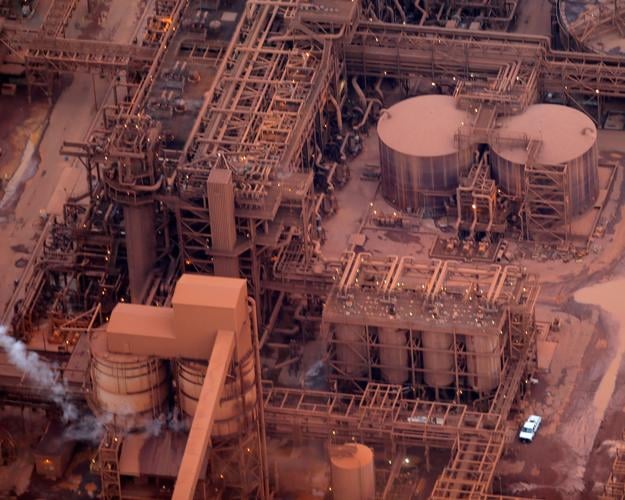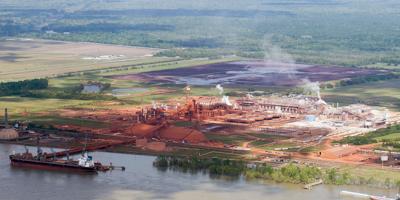An ore refining complex in St. James Parish has had so many serious worker health and safety violations in the past year that federal regulators say they will pull its workers off the job if another serious violation is found.
The Atalco Gramercy alumina plant has had 106 serious violations that were likely to lead to "reasonably serious injury or illness" in the past year, the U.S. Mine Safety and Health Administration found. One-third of those serious violations were so severe that the federal safety regulator cited Atalco for its "high negligence or reckless disregard," agency officials said.
That track record has kicked in one the agency's toughest enforcement actions, reserved for "chronic violators" who "demonstrate a disregard for the safety and health" of workers, agency officials said.
Called a "pattern of violations" notice, the action against Atalco means if the plant has another health and safety violation within the next three months, the regulators must, by law, pull workers off the job in areas where the alleged violation is occurring.
“Congress put the pattern of violations authority in the Mine Act for a reason," Chris Williamson, MSHA assistant secretary for mine safety and health, said in a statement on Friday. "To combat the troubling trend of fatal mine accidents in 2023, MSHA will continue to use all its enforcement tools to identify hazards that can jeopardize miners’ safety and protect our nation’s miners by requiring mine operators to immediately correct hazards.”

Then known as Noranda Alumina, this plant in Gramercy is seen from the air on Wednesday, February 24, 2016. Under different ownership, the plant is now called Atalco Gramercy.
One of the toughest sanctions
The federal agency hands down pattern-of-violations notices after screening all the mining-related operations in the nation and finding those that have had the most of the serious variety of health and safety violations.
The agency determined Atalco's rate of violations per 100 inspection hours was above the national average for similar kinds of facilities — 9.54 per 100 hours versus the national average of 8.09 per 100 hours.
The agency said it has conducted some inspections of the plant that turned up violations after receiving complaints about hazardous conditions.
Atalco Gramercy is a rust-colored facility that has been a fixture along the Mississippi River near Gramercy for years. In operation since the 1950s, it was originally held by Kaiser Aluminum and had been, in more recent history under different owners, known as Noranda Alumina.
The plant and its approximately 550 workers do not operate an underground mine, but they work in a refining complex that happens to fall under the purview of the U.S. workplace safety regulator for mining-related operations.
The plant turns red bauxite ore, which is mined in Jamaica and shipped to Gramercy, into alumina.
Alumina is a precursor in the production of the metal aluminum, as well as some specialty chemical products. The Gramercy complex is the last of its kind in the United States, the company says.
In addition to worker safety regulators, Atalco's predecessor, Noranda, had separate regulatory problems with state officials a few years ago over its previously unpermitted and significant air emissions of toxic mercury.
Before the latest actions, Atalco Gramercy officials had said they were working with regulators to improve safety after previous violations and trying to apply overdue upgrades following the ownership change a few years ago.
On Wednesday, company officials said they are taking the latest regulatory actions seriously and have made substantial progress, bringing in some new management to address those issues.
"Atalco takes our responsibilities as a critical advanced manufacturing facility in the US supply chain very seriously as the last bauxite alumina refinery in the USA," said Steven Smith, chief administrative officer and senior vice president of Atlantic Alumina, the company behind the Gramercy operation. "This includes the health and safety of all employees and contractors working at Gramercy."
Smith also pointed out that the Gramercy plant, due to its size, complexity and singular status in the nation, is a unique facility for the mine safety agency to oversee.
He noted that the United Steelworkers union, which represents the plant's hourly employees, joined Atalco in appealing to the regulator before the pattern of violations ruling was issued because of the substantial progress that had been made in the work environment.
Smith said the company and union "will continue to place health and safety as the most important aspect of working at our refinery."

The Atlantic Alumina refinery in Gramercy. ElementUS Minerals, which is proposing an $850 million facility that would recycle iron and rare-earth elements from the waste at the St. James Parish plant, has made it to the second phase of a U.S. Department of Energy loan program.
A history of violations
Though the latest action was triggered by a spate of serious safety violations between May 1, 2022, and April 30, 2023, Atalco and its predecessor, Noranda Alumina, have repeatedly run afoul of the federal safety regulator in recent years.
The plant has amassed 620 violations of all kinds between Jan. 1, 2019, and Tuesday, accruing $1.17 million in fines. About one-third were for serious health and safety problems, an agency database says.
A little more than two-thirds of the violations occurred after Concord Resources Ltd. acquired a majority stake in the plant and its related aluminum facilities in July 2021, the database says.
The plant has paid $672,037 fines — a little more than half of what is currently assessed — for the violations in that time period. The remaining fines are delinquent, were reduced after being assessed or are being contested, online records say. In addition, some of the newest violations haven't had fines attached to them yet.
A variety of local contractors working inside the plant also collected another 109 violations over the same 4.5-year time period, the database says.
Four of the 106 serious violations at Atalco between May 2022 and April 2023 were so severe that they resulted in special agency orders. Inspectors had learned workers were pulled off the job because they had not been given proper training and "presented a hazard to themselves and others," the agency said.
The latest actions also follow an "impact investigation" by the mine safety regulator in January that found a few dozen health and safety citations and forced the removal of two workers over training.
Those violations included incidents where the company had failed to take "prompt appropriate action to correct caustic material spills" and improperly maintained electrical equipment such that workers could have been electrocuted.
Under the rules for "pattern of violations" notices, companies can't get from under the federal requirement to have workers removed unless companies have gone three months without a serious health violation and then passed an inspection with no new serious health and safety violations.
Since April 30, the plant has amassed another 16 new violations, including three on Monday. Fines haven't been assessed yet, the federal database says.




